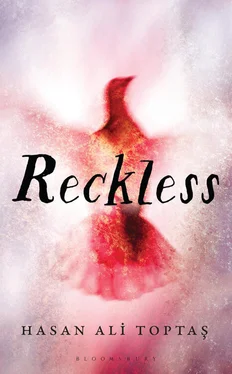‘Why did he look at you like that?’ asked the dark and scrawny man in the third row.
‘I don’t know,’ said Ziya.
‘My name is Kenan,’ said the man in a soft voice.
Ziya told him his name.
The ones in the first row had no interest in them; they just jutted out their chins, casting sidelong glances. It was as if they had done their military service many times over and were just back this time to watch. They would look around the yard as if they owned it, and then grimace, and then do that odd thing with their chins again, jutting them in the air.
Once the companies had been formed, and lined up neatly, the company commander emerged from the mess hall, two stars sparkling on each shoulder. With measured steps, he went to stand before them, and, propping his hands on his haunches, he delivered a long speech. In a haughty voice, he spoke to them of discipline, and responsibility, and equipment, and weapons, and honour, and how even newborn orphans had the right to a cap of water, and then, in a voice clouded by reproach, he spoke of the nation’s noble lands, and he named the various conspiracies threatening national integrity, and he located their centres of operation, both at home and abroad. And then he went on to speak of their sacred duty to the nation, and of failing that duty, and of loyalty to the army. And then, leaning lightly to one side, in the manner of a great hero, he spoke most solemnly about glorious chapters of history, and of the victories that had been written in gold in those pages, and of the illustrious generals who had won those victories, whereupon he turned his head once more, to speak again about the importance of discipline. Opening his arms wide, as if to embrace the entire company, he exclaimed, ‘Welcome to the prophet’s hearth, my children, let us see what you have in you! Take care not to shame our forefathers in their graves, or your mothers and fathers, or me!’
And with those words, they embarked on their three months of training.
From the first day, Ziya hated the food they made there: for there was no taste to it, and every plate and dish was ringed with oil that slopped about like petrol. And that was why he and Kenan and several others stayed away from the mess hall. They just couldn’t get used to it. But it wasn’t easy, going to the canteen for biscuits or cakes. Because no one stood in line there. It was always mobbed — a great khaki crowd pressing against the glass, pushing and shoving, and in the end, hardly anyone could buy anything. And then the soldier in charge of the canteen had such a hard time taking orders in all that commotion that he was always getting them wrong, and in the end he would just stand there, his arms upraised, like some picture pasted to the wall. Ziya joined that crowd just once, and from then on he never went back to it during mealtimes. And after that, he and Kenan would go out to the barbed wire behind the almond trees at mealtimes. Because at mealtimes, the other side was full of children from Silvan, swinging their straw baskets, selling boiled eggs, green onions, and flatbread. And sometimes they’d bring out yoghurt in muslin-covered wooden buckets and pewter or copper pots that still carried the warmth of their homes. They would lift them over the barbed wire, and in voices so dark they seemed to scrape your very insides, they would say, ‘Would you like some yoghurt, sir soldier? Would you like some yoghurt?’ And the more they asked, the higher their voices. That was because the sergeants came out sometimes, to tell them they weren’t allowed to sell anything, and then to beat them up. But the children would run away so fast and if their plastic shoes flew off their feet, they just left them there, lying in the grass. After they’d been chased away like that, fear would keep them away for a few days, and for a few days, quite a few soldiers would go hungry. But then one warm morning, their little faces would appear again across the barbed-wire fence, and once again they’d be calling out in those husky voices of theirs, selling boiled eggs, green onions, and flatbread.
Except that they never came to the barbed-wire fence at breakfast time, these children: when the company straggled back from their morning exercise session in one great cloud of sweat, these soldiers had no choice but to file into the mess hall to drink their tea — or their soup, if that was what they were serving that day. Each morning, after callisthenics, they would set their rifles down on the field and strip to the waist, to walk back and forth with the sergeants leading them, and then, when their muscles had heated up a little, they would turn towards the Malabadi Bridge, singing folk songs as they ran, and as soon as they caught up with their instructors, they made a great arc, turning towards the Koçaş mountains, to run lap after lap in the training ground at the foot of those blue-grey cliffs, and then they would run back, by the same route, arriving in an exhausted state outside the mess hall, where they’d left their rifles. The mess squad would already have laid out their soups or teas, with a piece of bread to one side. When everyone had piled inside, their sweat would steam it up, of course; and as they sat in that narrow, low-ceilinged room, they would struggle to breathe. After breakfast, they would walk in quick time back to the training field at the foot of the Koçaş mountains, singing marching songs as they went. When they got there, they would line up and wait for the second lieutenant to inspect their company; planting his hands on his hips, he would walk back and forth, nodding now and again, as if agreeing to whatever his invisible companion was telling him, and then he would stop abruptly, and turn on his heels, and then he’d subject his men to a long, hard stare, while his expression grew steadily stranger. As if he was not just inspecting them for himself, but for the company command, and all the other commanders, in the name of the nation, and all that was inside it, as well as outside it, and probably even in the name of its enemies and friends.
Then he would look down, this lieutenant, and smile slyly, and when he raised his head again, he would bark: ‘Yes, I can see that you all shaved last night, you all shaved last night, didn’t you?’
‘Yes, sir, we shaved last night,’ the men would reply.
The lieutenant would be overjoyed to hear this answer, and his sly smile would stretch so wide as to take in all the other companies, and the training field, too.
Then the lieutenant would lean back slightly and bellow: ‘Bravo! You managed to shave, like every other idiot bachelor in the world, and every man idiotic enough to get married!’
He would say this with great delight each morning, as if it was the greatest punchline in the world.
It pained Ziya to see how much pleasure this miserable lieutenant took from laughing at the helpless soldiers lined up before him, and because he was afraid this man might read his feelings, he stood at attention, averting his eyes. At the same time, it seemed to him that this man was hiding in the shadow of the metal star on each of his shoulders; that he should choose such a simple way to ridicule the men lined up before him was proof that he was wretched and afraid. So when the training began, he couldn’t stop himself from looking at this lieutenant whenever the opportunity arose. The lieutenant would step away from the sergeants drilling them and watch them from a distance; planting his hands on his hips he would stroll around the edges of the field, giving every impression of entertaining deep thoughts, and every once in a while, he would allow himself a sly smile; but never for long. Or rather, it was never long before the lieutenant’s spirits plunged. And that was when he fell into a strange displeasure, this lieutenant; unable to shake it off, he would stop in his tracks. Arms akimbo, he would look more closely at the men in the field, and looking more closely he would spot a number of faults. Whereupon his hands would rise from his hips to fly through the air like angry arrows, of course, as he called each wrongdoer to account. This one had his cap crooked. That one had fallen to the ground in the required way but had stood up incorrectly. And that one over there was holding his rifle like a shepherd’s musket, and when he thrust his bayonet forward, he had failed to keep to the rhythm of the chant: Strike! Lion! Mehmet! Strike! One by one, he laid into them. Showing no mercy. He kicked them with all his strength, actually. Kicked them and punched them, until they were bleeding from the nose and the mouth, and then he would relax and say, ‘Ohh,’ a very deep ‘Ohhhh,’ and, putting his hands back on his hips, he would walk away, very slowly, with a spring to his step.
Читать дальше












